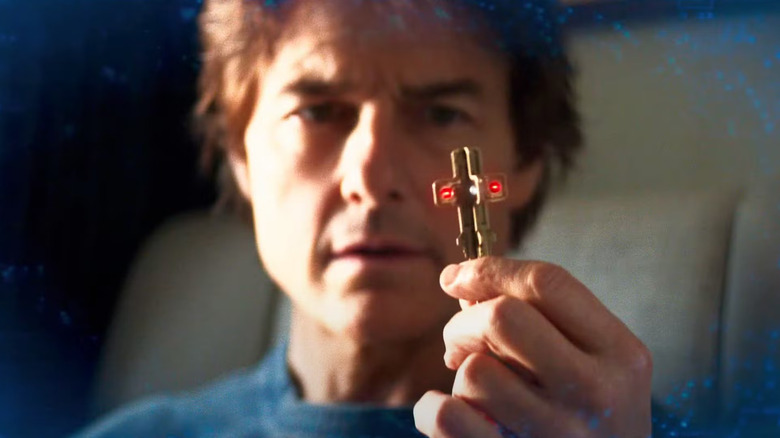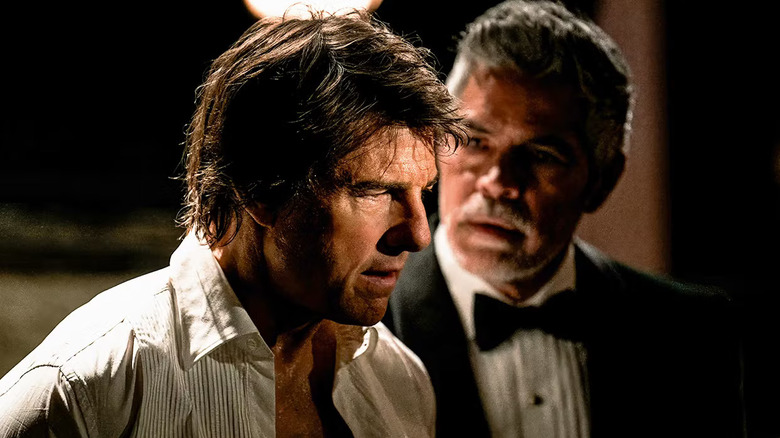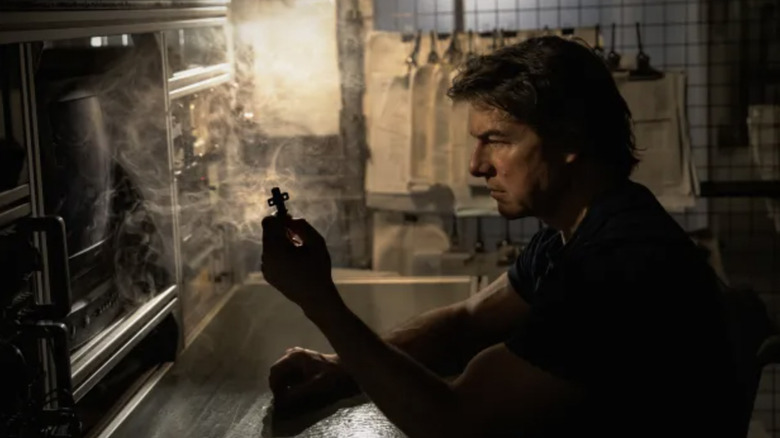How Mission: Impossible — The Final Reckoning Changed After The Seventh Movie Flopped
For many film critics watching "Mission: Impossible — The Final Reckoning" during its record (for the franchise) opening this past weekend, the first act or so of the film seemed off. Those with a trained, discerning eye for cinema recognized that something about the opening scenes felt like they weren't unfolding as originally intended, or even, perhaps, as originally shot. Leaving aside the flashbacks to prior films in the series (which are operating on a different level than mere fan service), the flashbacks to the first part of the concluding saga of the franchise, "Mission: Impossible — Dead Reckoning," felt like too much to them, and the arrangement and pacing of the huge amount of plot and character beats before Ethan Hunt (Tom Cruise) is brought before President Erika Sloane (Angela Bassett) seemed strange. However, a large number of fans and general audience members don't see these same issues, or if they do, they don't regard them as problematic. Instead, they view these moments as necessary and engaging rather than underdeveloped and sloppy.
It turns out that there's a reason for both these responses: as co-writer/director Christopher McQuarrie revealed in a recent tell-all interview with Josh Horowitz, his and Cruise's approach to "The Final Reckoning" changed as a direct result of the lukewarm response to "Dead Reckoning." Although that film was not a flop by normal standards, it underperformed financially due to the cost of other factors exacerbated by the COVID-19 pandemic. As McQuarrie said, he was more concerned with the box office as a reflection of audiences not warming to the film as they had previous "M:I" movies, rather than blaming its underperformance on the juggernaut release of "Barbie" and "Oppenheimer." He and Cruise "looked at the film, very, very critically," discussing how to simplify and shorten what was already a very ambitious story with lots of moving parts.
One of the simplifications was easy, simply retitling the movie from "Dead Reckoning Part Two" to "The Final Reckoning," learning the lesson that many other releases seem to be realizing when it comes to multi-part films. In terms of the other changes, McQuarrie explained how he and Cruise chose to make some sacrifices — not just with scenes, but with style — to best deliver the information they knew needed to come across to as wide an audience as possible to have another hit.
McQuarrie made The Entity and other exposition simpler, faster, and clearer
One of the joys of "The Final Reckoning" (assuming you're generally into the film and the "M:I" series) is how it's both a payoff for the entire franchise and its own unique movie, even leaving "Dead Reckoning" aside. Ethan's struggle against the amoral rogue AI known as The Entity expands beyond the intelligence community to become a clear and present danger to the entire world: it changes the very concepts of reality and truth within cyberspace, recruits those it radicalizes as acolytes, throws every nation into political and social chaos while edging them toward nuclear annihilation, and so on.
After that hefty bit of alt-history world building, McQuarrie and co-writer Erik Jendresen have to bring the journey of Luther Stickell (Ving Rhames) to a close, reintroduce Gabriel (Esai Morales) as a fallen Entity acolyte now working for himself, and set up the whereabouts and team status of new members Grace (Hayley Atwell), Paris (Pom Klementieff), and Degas (Greg Tarzan Davis). Most crucially, they give Ethan not one but three missions to complete: President Sloane orders him to turn himself in, Gabriel demands that he retrieve and hand over the Entity's source code, and the Entity itself insists that he bring it to a remote digital bunker (all of which are impossible, especially in conjunction with each other, and all of which Ethan manages to accomplish, of course).
With this much material to juggle, McQuarrie realized that handling it gracefully was going to be his own impossible mission. Initially, he attempted a cut of the film which was non-linear, meaning that Ethan and President Sloane's confrontation scene happened first, with the other material turned into flashbacks. When that didn't work, he tried a linear cut, which also didn't work since it didn't properly introduce The Entity up top. Thus, he and Cruise concluded that being as forthright as possible was the way to go, as McQuarrie explained:
"That's the big lesson for Tom and I, over and over and over again. There's just a point where you just have to say it. Just f—ing tell 'em ... And that's why the scene where Ethan confronts The Entity, that scene contains within it everything I insisted could not be in the scene, and contains nothing that Tom insisted must be in the scene. It's a rejection of everything we believed could or could not be, and we did it two days before we locked picture."
The compromise for having the AI villain flat out state its threats and goals was McQuarrie, the sound team, and the film's composers making an experiential and emotional meal out of such a nakedly expositional scene. While the filmmakers may feel it's a step back from their initial vision for the confrontation, I believe the sequence still works as a dark mirror to the typical IMF mission briefing, which is something McQuarrie has been driving at since the opening of "Rogue Nation."
The beginning of 'The Final Reckoning' still has a lot of great material to offer
The straightforward presentation of The Entity confrontation was far from the only change made to "The Final Reckoning" during the final days of making the film. As he and his collaborators had done on their prior "Mission" films, McQuarrie was ruthless with cutting this movie to the bone. For example, McQuarrie confessed he did indeed write and shoot a more in-depth flashback that helped clarify the backstory between Ethan, Gabriel, and Marie (Mariela Garriga), the woman whose death caused Ethan to join the IMF. However, he had two reasons for cutting it. One was that, due to the acting and writing strikes of 2023 delaying production, "The Final Reckoning" is being released two years after "Dead Reckoning" and not one, meaning that there were more pressing threads and characters for the film to contend with. The other is that, at least plot-wise, the Marie story had no bearing on the movie at hand. As McQuarrie said, "The truth of the matter was that, unless I made that movie, it's always going to feel somewhat ambiguous and open-ended anyway, so we just said, 'Screw it.'"
McQuarrie and Cruise's decisions to make "The Final Reckoning" as lean and streamlined as it is will be the subject of heated debate amongst "Mission" fans for years to come, no doubt. Unfortunately, McQuarrie has been vocal about his distaste for director's cuts and extended editions, for it likely means that we'll never see a longer version of the film. While we can hope to see the deleted material in some capacity, that's not certain, either. Yet, while a four-hour version of "The Final Reckoning" may possibly be a more thorough movie, there's no guarantee that it'd be better. After all, many folks seem to be enjoying the film and its forthright exposition, and it's a treat to have a movie take this much care with its audience as opposed to expecting them to have done their homework beforehand.
Whether you believe the structure, pacing, and editing works or not, you have to concede that the first third of the film contains some great material regardless: the emotional demise of Luther, the eerie and apocalyptic visions that The Entity gives Ethan, and especially the pre-credits sequence where Grace and Ethan escape from Gabriel's clutches, featuring one of the most inspired visual gags in the entire series. Most of all, it's important to remember that a film with a great ending must have a proper foundation for that ending to be great. So, if you love the ending of the film (which the majority of viewers seem to), you have to at the very least acknowledge that what McQuarrie did to the beginning of the film helped allow that ending to be so spectacular. Like Ethan Hunt himself knows, the process may have been bumpy and improvisational, but the mission was accomplished in the end.


